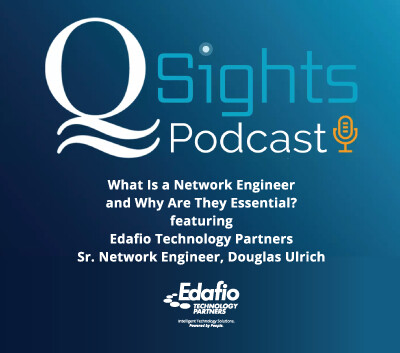Edafio’s Sr. Network Engineer, Douglas Ulrich had the privilege of being the featured guest to talk about what a network engineer does and why they are essential with Q-Sights, a technology podcast for businesses looking to innovate.
Aaron: Welcome, Douglas! We are happy to have you on Q-Sights to share what it means to be a network engineer and why they are essential to businesses. Without further ado, let’s introduce Douglas and learn more about his profession.
Douglas: Hi everybody, Thank you for having me on the show, Aaron. It is nice to meet you.
Aaron: Thanks for hopping on today, and let’s roll right into the questions. We will start with a basic one.
Can you provide us with a brief and general overview of what a network engineer is and what they do?
Douglas: Sure. The general goal of a network engineer is to allow data communications for business. So, if you’re lucky, that is simply allowing things like connectivity to the internet or wireless connectivity. If you’re in a smaller company that may only have one IT person, you may be doing data connectivity, securing that data, and voice connectivity as well.
Aaron: And then do network engineers usually work in-house for one business, or do they tend to work in an agency setting with multiple clients or maybe even both?
Douglas: It really depends on the scale. A lot of small businesses tend not to need a network engineer 24/7. They tend to contract that out, but as you get to be a larger enterprise with multiple locations, they tend to hire inside so that that the engineer can learn the ins and outs of your network to support it better.
Aaron: Okay, got it, so basically, smaller businesses might not need a network engineer 24/7 on-site, and they would probably outsource it to a managed service provider. Meanwhile, a corporation probably has network engineers on staff full-time. Now Douglas, would you mind giving us some background on your experience and how you got to your current position at Edafio?
Douglas: Of course, my actual college degree was in computer systems focusing on networks, but in the middle of my college career, I started interning at a local internet service provider. So I started working in their broadband network and began working with technicians to troubleshoot with DSL connections. That was my introduction to networking, where I worked on the Network Operations Center. Here I received escalated tickets working on the issues we could resolve in a short time and move on to the next client.
Later, I moved from working with those individual DSL customers into handling the backbone of the internet service provider and handling their giant routers and their connectivity across the entire country. I went from working with individual clients to routing the whole internet for this company. I focused on extensive networking, routing from that point on.
I moved over into the private banking sector, where I worked as their network architect. The bank had one large center, multiple data centers at various locations. So for them, I wasn’t just doing networking as far as routing goes over the internet; I handled their entire infrastructure. I was installing switches, access points for wireless, working some with their firewalls, and generally creating a three to five-year plan as well as troubleshooting day-to-day tech issues for that enterprise. I did that for a few years, and then I moved into Edafio, where I am doing these services for multiple clients. I help numerous clients troubleshoot their day-to-day and create design plans for the long term with their networking.
Aaron: Have network engineers always been around, or has this role that’s blossomed over the past few years?
Douglas: Network engineers have changed over the years, but they had needed to exist even before I was network engineering. We had mainframes and connect individual workstations to some central computer at the enterprise. That was what your network engineer usually did and worked with modem lines, etc. By the time I came on the field, networking had become a little bit nicer. We still had some very advanced technologies, but they integrated well with computers. We got kind of like an IP stack, and it was easier to work with the various fields, so networking has existed. In the past, it was much more siloed. Before, you had to know just networking because of how specific it was, but it’s gotten a little bit easier with our advanced technology. We have had to learn a more comprehensive technology scope because now the network doesn’t just affect the network; we have all the security and server aspects that we must consider, so the job changed in its specificity over the years.
Aaron: Now that brings us to our next question. What might your typical day look like as a network engineer consultant?
Douglas: The way I like to plan my day and how we hope it is every day is to spend it reviewing change control. So, let’s say we needed to swap out equipment or cause an outage because of some change we need to make on the network. I am in charge of coordinating with the client on facilitating the project, so it does not affect their business. I could be designing new network topologies if they had older equipment; it could be inspecting their equipment to make sure their warranties and firmware are up to date or if we need to create a new design with the latest technologies. Say that they’re moving on-prem from an MPLS network to an SD-WAN setup and changing circuits, you know, just some new design that could cost less or increase their business somehow. I do a lot of inner team collaborations. I am working with our server engineers, cloud teams, and cybersecurity teams to design a holistic picture and not just design in the dark. And there’s a lot of learning; I probably spend four or five hours a week just attending vendor seminars and listening to new emerging products to determine the technologies my clients need. Now that’s if I can plan my day- if I can’t plan my day, and there are unplanned requests, such as someone needs a new network spun up, or they have a new circuit that requires turning on, or there’s just a device failure, then I need to spend my day replacing a firewall, a switch or talk to a support per vendor to try to get the issue resolved.
Aaron: Something I realized, as you were speaking, is it sounds like there is a lot of communication going on, whether it’s with vendors, with colleagues and with clients. People assume that most IT and tech jobs don’t involve interaction. They think it’s just a person sitting behind a computer, typing away doing their code or whatever their task may be. Would you say this is a common misconception about network engineering that communication is unnecessary in the role?
Douglas: Yes, I would say so. I think it leads back to your question of how it was years ago. I think years ago, the network engineers could get away working in their silos. Really, the whole IT organization was, and I think we’ve learned from that over the years. We realized that it used to be seen as a call center. Now it’s more business enablement. You need your IT and network to work to be able to serve your customers. The coordination and collaboration that exists with the clients and our other teams to ensure servers respond well, your web app always works, and your phone works every time you make a call. These tasks have become more critical, and it was time to remove the silos. Now, we are your IT partner to help businesses stay protected and running. We’re no longer the server team and the network team, etc.
Aaron: So switching gears a little bit, since the pandemic forced many employees to start working remotely and teams are spread across the globe in different time zones, countries and continents, I wonder if businesses are experiencing more network issues.
Douglas: Well, if you would ask me this question right when the pandemic hit, I’d say we seemed somewhat prepared. Most corporations already had some type of remote VPN connectivity when someone needed to work from home. For the most part, we had to buy some extra licenses, maybe upgrade a firewall, and then we had connectivity. But as the pandemic continued, other issues arose that many of us weren’t aware of when the pandemic first hit. We’ve had problems such as a client not working successfully from home. How are you ensuring that they’re not exfiltrating data, or how are you troubleshooting their home internet connection? Now, we people and workforces are constantly working from home. WFH is no longer a temporary solution. Now, we’ve got people who are always going to be there. So how are we making sure they can access the data they need to reach and not the other data.
As I mentioned before, not only do I have to worry about do we have basic network connectivity, I’ve also got to worry about what they can reach data-wise and can we do it securely.
We have experienced some network issues, and I think we’ve mostly figured out everyone’s home internet connection at this point. We are dealing with more advanced security issues with everyone spread out.
Aaron: That makes sense. So at first, when everyone moved remote, you had to ensure everyone’s networks, although you met their basic necessities, now you begin to focus on the more in-depth tasks to keep the networks up and running as best as possible. I have one final question, and it’s going to be hypothetical.
So let’s say you’re in a room with a CEO of a medium-sized business, and the CEO never heard of a network engineer. What are three of the most important things you would want that CEO to know about your role as a network engineer and how you can help their business?
Douglas: Well, I kind of work with this day to day with our clients. There’s a lifecycle to what I can do to help your business. Like I mentioned before, the job of a network engineer is to enable your business to run and stay secure. So the first thing I would offer is assessing your current technology infrastructures. Many clients I see have aged equipment and a lot of downtime because they don’t have high-availability equipment. They may not be as secure as they want to be or, let’s say, and are paying too much for their ISP service. We perform a network assessment and advise them on what improvements they can make to their existing equipment. For instance, they want to make sure their voice traffic never drops, or we could recommend that you move to this equipment type using these new circuits and save $500 a month. So the first thing we can do for them is assessing where they are right now.
The second important thing to do is where they envision their business to be in the future. Do they see themselves expanding to more locations?
Are they considering migrating to fully remote work staff and getting rid of offices?
We hear some are moving their services to the cloud and need assistance.
Are they bringing BYOD?
By evaluating where they want their business to go, we can help them build a network that works properly and securely. So once we’ve assessed where a company is and determine where it wants to be, we can collaborate and decide on its ideal design to help them scale and succeed. Then, it’s really about deployment. We make sure to deploy so there are minimum outages to their current environment and that they recognize the return on investment very quickly. We routinely document, monitor and provide reports to confirm their level of security and technology is up and running. So they don’t have to keep up with it or worry about it anymore.
Aaron: That makes sense. It sounds like, at first, we have to focus on getting networks to a stable place for maintenance purposes before you can move on to the more in-depth projects.
Douglas: Yes, we’re very used to onboarding our clients to quickly assess where they are and get them up to a sound security standard that we can maintain.
Aaron: What other services does Edafio offer, or are they mainly in the realm of network engineering?
Douglas: Edafio offers a wide variety of IT consulting and managed services. In addition to doing the network equipment, as I’ve mentioned, we also handle PCs, servers, and cybersecurity. So we will either consult on those doing assessments or let you know what you could change. We also manage IT. Say, if you wanted to have one of our engineers on-site every once in a while or have us remotely monitor your IT ecosystem instead of maintaining your own IT needs.
We offer both consulting and managed services depending on what the client wants. In addition, we can assist in cloud migration with our cloud computing services or cybersecurity risk assessments.
Aaron: Before I let you go, Douglas, is there any way for people to reach out to you if they have any questions or want more information on any services that you are Edafio provides.
Douglas: If you wanted to reach out directly to me, finding my LinkedIn page would be the quickest. To get in touch with Edafio, go to www.edafio.flywheelsites.com.
Aaron: Okay, that wraps up today’s episode of Q-Sights on What is a Network Engineer. Let’s give a big thank you to Douglas Ulrich from Edafio for joining this conversation. Let us know if you have any questions or are interested in how Edafio can help your business. Please email us at info@edafio.flywheelsites.com for consultation or learn more about what Edafio has to offer at www.edafio.flywheelsites.com.








